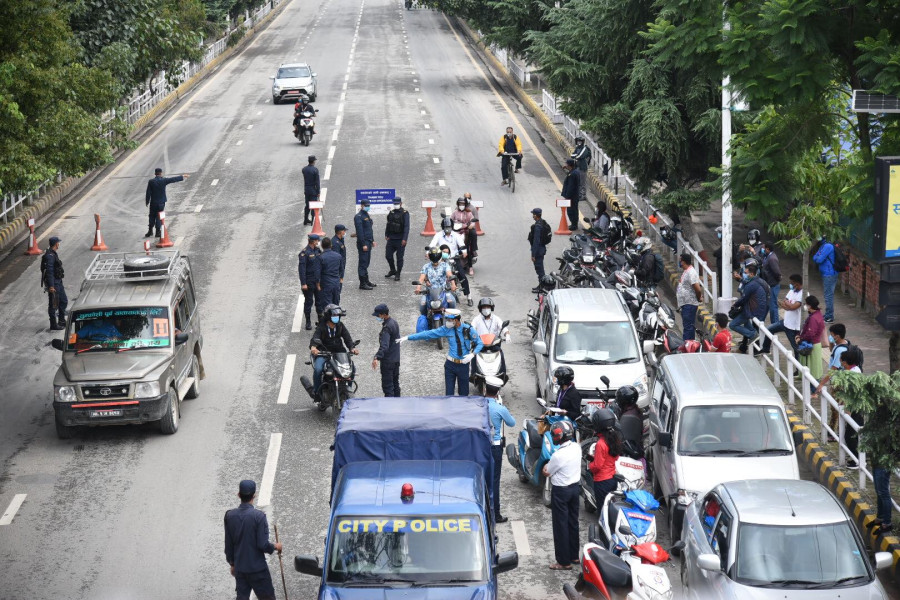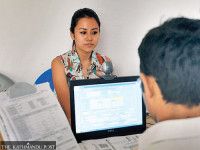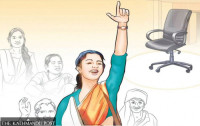National
By extending restrictions, government is barking up the wrong tree, experts say
Authorities are still not following the basics–ensuring effective contact tracing, isolating the infected, listening to experts and having dedicated Covid-19 health facilities.
Arjun Poudel
On August 18, chief district officers of Kathmandu, Lalitpur and Bhaktapur decided to issue prohibitory orders for the three districts in the Valley for a week effective from August 19 midnight.
The total number of Covid-19 cases for the Valley until August 19 stood at 2,498, according to the Health Ministry.
In the first week of the prohibitionary orders, the Valley’s Covid-19 tally had reached 4,019, an increase of 1,521 cases. On Wednesday alone, 301 new cases were reported, a record single day increase.
Between July 22, the day the lockdown was lifted, and August 18, the Valley had reported 1,957 Covid-19 cases.
As expected by many, the chief district officers of the Valley on Wednesday decided to extend the prohibitory orders by another week, until September 2 midnight.
The decision to extend the orders comes amid public health experts’ longstanding arguments that restrictions are not a solution to the spread of the disease and that authorities must utilise the period to conduct contact tracing effectively, expand tests and build facilities to isolate and treat the infected.
Along with three districts of the Valley, more than 35 districts across the country are under prohibitory orders to contain the spread of the virus.
The Health Ministry said on Wednesday that 885 new cases were reported from across the country. The national Covid-19 tally now has reached 34,418, including 175 deaths.
The ministry said that 11 people died in the last 24 hours, which is also the highest death toll from the virus in 24 hours.
Public health experts say the authorities are still barking up the wrong tree.
“The authorities should have equipped the country to ramp up test, trace and treat rather than focusing just on restrictions,” said Dr Subhash Prasad Acharya, head of Critical Care Department at the Tribhuvan University Teaching Hospital. “The government by now should have taken a 500-bed hospital or medical college under its control and converted it into a fully Covid-19-dedicated hospital.”
According to Dr Sameer Kumar Adhikari, joint-spokesperson for the Health Ministry, there are 900 ventilators and 2,600 ICU beds across the country. These ICU beds and ventilators, however, are not all allocated for Covid-19 patients, hence there are concerns that many infected people might not get proper care given the rise of cases at an alarming rate.
Public health experts say the government has not yet figured out what is the best way forward when it comes to dealing with the pandemic, which is posing newer challenges by the day. According to them, the government still appears reluctant to put together a national network of experts–critical care experts, people with experience in disease surveillance and case management and risk communication and experts on information and communication technology—to fight the virus in a collective and collaborative way.
Dr Prabhat Adhikari, an infectious disease expert, said that even experts on information and communication technology and risk communication can play a significant role in contact tracing to contain the spread of the virus. Contact tracing is considered the best way to break the transmission chain.
Restrictions imposed by various countries around the globe were meant to ensure that no one contracts the virus from the infected, as no public mobility means people don’t come in contact with each other.
Restrictions in the Valley for the last one week may have helped break the transmission, but the rising number of cases means there already are people in large numbers living with the virus and there is a need to track these people in a proper and effective way.
“We do not have sufficient human resources for contact tracing,” Adhikari, the infectious disease expert, told the Post. “We should take help of experts, use technology and all other possible means to contain the spread of the virus.”
The four-month-long lockdown from March 24 to July 21 showed how it had a profound impact on the country’s economy as well as on the people from the lower economic strata.
An official at the Covid-19 Crisis Management Centre told the Post that proper care can help save lives and that the focus should be on how to quickly ensure isolation and treatment for the infected rather than imposing restrictions and waiting for better results.
“A lot of infected people are dying for the want of proper care,” said the official, who spoke on condition of anonymity fearing reprisal. “We need to ensure that there is enough supply of oxygen. We need to have more intensive care units and ventilators.”
The government, however, is yet to take initiatives for converting health facilities into Covid-19-dedicated hospitals, and is instead trying to force private hospitals to allocate 20 percent of their beds for coronavirus treatment, an idea which has already been criticised by doctors as well as private sector health care providers.
Acharya from the Tribhuvan University Teaching Hospital said that converting some hospitals into dedicated Covid-19 hospitals will be a more prudent decision than setting up new facilities.
“Hospitals which are currently in operation have their own manpower,” Acharya told the Post. “The authorities must not hesitate to hire new staff and provide training to them. The government should invest in experts and equipment.”
Doctors admit that since the virus is new, many coutries, including developed ones, too are struggling to deal with it. But every government is trying their best and learning lessons from others and being careful not to repeat the mistakes made by others and themselves, according to them.
Adhikari, the infectious disease expert, said that the government should rely on science, take rigorous steps to collate information, bring together experts from various fields and rely on evidence-based reasoning in the fight against the pandemic. “China, where the virus was first detected, and Sri Lanka in South Asia managed to contain the virus by forming teams of experts. The Indian state of Kerala is also an example.”
Even the World Health Organisation hailed Kerala’s response to Covid-19, saying active surveillance, setting up of district control rooms for monitoring, capacity-building of frontline health workers, risk communication and strong community engagement, and addressing the psychosocial needs of the vulnerable population were some of the key strategic interventions implemented by the state government that kept the disease in control.
Dr Sher Bahadur Pun, chief of Clinical Research Unit at the Sukraraj Tropical and Infectious Disease Hospital, said it’s also time the government started sero prevalence surveillance besides using other technologies to keep track of the virus spread.
A sero prevalence survey involves testing the blood serum of a group of individuals to monitor the trends of prevalence of the coronavirus at the community level.
“We have been saying for long that the virus has spread everywhere,” Pun told the Post.
“But to know the actual status of the virus spread, a sero prevalence study is needed. The study can help us guide what measures to take and what strategies to make.”
Pun said that the government and administrators must realise that restriction alone is not going to help.
“We have to wake up and start to take necessary measures to contain the spread of the virus,” said Pun. “Listening to experts does not harm anyone.”




 9.2°C Kathmandu
9.2°C Kathmandu














